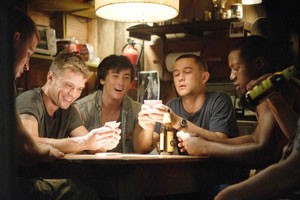In absolute silence, we are transported to Iraq where we quickly get thrown in the mix with soldiers Steve Shriver (Channing Tatum), Brandon King (Ryan Phillippe) and Tommy Burgess (Joseph Gordon-Levitt). Amid a high speed chase, rapid gun fire and a lot of blood, the first 10 minutes of the movie are nothing like the touching, tear-infused trailers that have been playing on TV over the past few weeks.
Despite the noise and in-your-face violence (keep in mind that this is an MTV production and therefore requires some sort of shock value), the beginning scenes of “”Stop-Loss”” nicely set up the rest of the movie, which is almost completely focused on the characters and not the plot.
“”Stop-Loss””
Rated R – 113 mins.
Paramount
Starring Channing Tatum, Ryan Phillippe and Joseph Gordon-Levitt
3 1/2 stars
Leaving Iraq, the entire rest of the film is set in small town Texas, the home of Shriver and King, hometown football heroes and best friends who enlisted together. After the requisite welcome-home parade, drunken shitshow and enough country music to make your ears fall off, we find out that King has been “”stop-lossed,”” meaning that although he has completed his tours of duty, he must return to Iraq due to a shortage of enlistees and a need for soldiers in combat. After this bad news, everyone starts cracking at the seams, and the next hour takes a close look at what happens when soldiers return home from war, changed from the experience.
King cannot bear the thought of returning to Iraq and goes AWOL. Deciding to go to Washington D.C. to visit a Texas senator who promised to help him, he and Shriver’s fiancée Michelle (Abbie Cornish) set out. Along this drawn-out road trip, King’s character is revealed in sometimes-overt ways. With a perpetual pensive look on his face, King gets into multiple fights and even shoots a few men while on his way. Deciding the senator will not help him, he contemplates eschewing his identity and moving to Canada.
Shriver becomes obsessed with holding his Army unit together, and makes it his personal mission to get King back to the base on time. In the midst of that, he agrees to re-enlist, with the promise of a free trip to sniper school. Upon deciding that he is truly “”married to the Army,”” his fiancée leaves him.
Lastly, we get to watch Burgess drink his world away. In a few depressing scenes, we see him get into fights (a common theme in this movie), get left by his wife and receive multiple DUIs.
The characters paint an interesting portrait of the Iraq war, as well as the common theme that war changes a person. The characters are fairly believable and while the plot is interesting, it drags on at times and feels a bit sluggish. While the actors all give valiant efforts, some of the dialogue and plot are so stereotypical and basic that the writing feels a bit elementary and too “”MTV”” for the big screen.
Although the film obviously leans to the left side of the political spectrum, the end might surprise you – if you can stay awake long enough to get there. Despite its flaws, “”Stop-Loss”” is a decent attempt to bring this current political hot button issue to younger generations.









